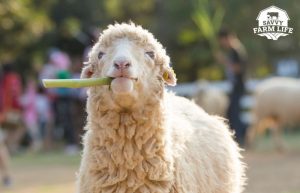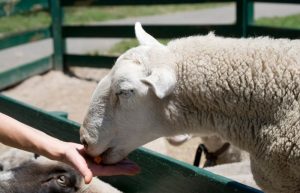
What Are the Best Treats For Sheep
Sheep can be nervous animals, but you may be able to coax them out of their comfort zones by offering them treats. You might use treats to strengthen your bond with your sheep, encourage them to trust you, and even to train them. If you choose to offer your sheep treats, it is important that you know what foods you can (and cannot) feed your sheep.
What treats can you safely feed to sheep? Here is a list of healthy and safe treats you can feed to your sheep:
- Apples
- Carrots
- Sunflower Seeds
- Lettuce
- Grapes
- Pumpkin
- Watermelon
- Oats
- Animal Crackers
- Pretzels
- Cheerios
While these treats may be safe to feed your sheep, just remember that they should be fed in moderation.
While there are many different foods you can feed your sheep as treats, there are also just as many that you should not feed your sheep. Read on for the specifics of what types of foods you can and cannot feed your sheep, as well as what types of treats you should feed sparingly.
Safe Treats For Your Sheep
Most treats that are recommended for sheep will be fruits and vegetables. Sheep are herbivores, and should never be fed animal products, as their bodies are not designed to process meat and dairy products. Below is a list of foods that you may safely feed your sheep in moderation.
Apples – sheep love apples, and apples can be beneficial to sheep. Apples have plenty of fiber and carbohydrates, providing sheep with a steady source of energy. They also provide essential nutrients such as polyphenols and potassium which are important for gastrointestinal health.
Carrots – carrots are another tried and true treat that sheep enjoy, providing ample vitamins and fiber content which are beneficial to the health of sheep. Carrots also provide carotenoids, which helps to improve both eye and heart function.
Sunflower Seeds – sunflower seeds, especially black oil sunflower seeds, are a tasty and easy treat to feed sheep, and can benefit a sheep’s fleece.
Lettuce – sheep enjoy lettuce as a treat, and it is easy for them to chew as well. Lettuce provides nutrients such as vitamins and fiber.
Grapes – grapes are a delicious treat for sheep, and are also easy to feed. Grapes provide several vitamins, including C and K, and also provide antioxidants that protect the health of the sheep by lowering inflammation and preventing disease.
Pumpkin – pumpkin is a common treat fed to sheep, and one filled with vitamins and nutrients that are beneficial to sheep as well. Pumpkin seeds are also known to protect against internal parasites, often fed livestock for that reason alone.
Watermelon – watermelon is tasty and easy for sheep to chew. In addition to the many vitamins that watermelon offers, the biggest benefit to feeding watermelon as a treat is for it’s namesake – the water. Watermelon is 90% water, and is a welcome way to help sheep stay hydrated during the Summer months.
In addition to the above, you may also safely feed your sheep squash, pears, and peaches. Oats are another common treat that shepherds offer their sheep, though should be done sparingly. Some keepers have also been known to feed their sheep treats that they themselves might snack on – including animal crackers and pretzels! I personally find that just about any livestock animal also loves a handful of cheerios!
To get a complete overview of how to care for sheep, check out my article How To Care For Sheep: Essential Guide For Beginners.
What To Avoid Feeding Your Sheep
In addition to knowing what healthy treat options there are for your sheep, it is important to know what you should not be feeding your sheep. There are several food items that can be unhealthy at best, and toxic at worst, if given to your sheep.
Animal Products – as stated earlier, the sheep’s body is not designed to process meat and dairy products. Providing any animal products to a sheep would not only be unhealthy but would likely cause stomach and digestive upset.
Nightshades – vegetables in the nightshade family include peppers, tomatoes, and eggplant. Nightshade vegetables can be toxic to sheep due to the high alkaloid content. If given food from this family of produce, your sheep may experience lethargy, vomiting, and respiratory distress.
Brassicas – vegetables in the brassica family include broccoli, cabbage, cauliflower, turnips, brussel sprouts, and kale. These vegetables have small amounts of sulfur which can lead to health problems for sheep, including respiratory distress, digestive upset, and tachycardia. In addition to these health concerns, turnips pose an additional threat to the sheep’s thyroid.
Chocolate – not only does chocolate lack nutritional value that might benefit sheep, it is also toxic to many mammals and should not be given to sheep.
Avocados – avocados are toxic to sheep, and this extends to every part of the avocado plant. Avocado products contain a toxin called persin, which the sheep’s digestive system cannot dissolve. Symptoms of persin toxicity may include swelling in the head and neck, digestive upset, and respiratory distress.
Potatoes – potatoes contain toxins and glycoalkaloids that are poisonous to sheep. This is particularly true of the potato’s skin, but the caution should also extend to the meat of the potato, and the potato plants.
Rhubarb – rhubarb is toxic to sheep and should not be given as a treat – this includes not only the leaves, but the stem and the rest of the plant as well.
When Feeding These Foods to Sheep, Proceed With Caution
 There are a handful of foods that are not beneficial to your sheep, but may not be toxic in small quantities either. You should use caution when feeding these foods to your sheep.
There are a handful of foods that are not beneficial to your sheep, but may not be toxic in small quantities either. You should use caution when feeding these foods to your sheep.
Citrus – if given large amounts of citrus, your sheep may experience gastrointestinal upset.
Onions – onions are toxic to many mammals, and though sheep are slightly more resistant to the toxin found in onions that most other mammals, you should still use caution with them.
Celery – celery contains furocoumarins which can cause photosensitization in your sheep. Use caution if feeding celery to your sheep, and always avoid feeding sheep the seeds and roots.
Parsley – parsley contains the same furocoumarins as celery and carries the same concerns.
Copper Toxicity in Sheep
While copper is a vital mineral and is integral to the health of mammals, sheep are highly susceptible to copper toxicity. Because of this sensitivity, it is important that when providing commercial feeds or mineral blocks to your sheep, you always purchase one formulated specifically for sheep. Unless there is a vet-diagnosed copper deficiency in your sheep, you should never supplement any additional copper into your sheep’s diet.
How To Safely Feed Your Sheep Treats
The last thing you want to do when treating your sheep is to cause them harm, and this is what can happen if you feed them hard foods that may get stuck in their esophagus. Any hard treats should be fed to your sheep in small, bite-sized pieces. This is especially true for apples and carrots, which are easy to choke on. You may also choose to shred apples and carrots before giving them to your sheep – they will enjoy the taste, the crunch, and the ease of chewing. Older sheep, especially, may have several missing teeth and molars and may be unable to properly chew before swallowing.
Choking is also a concern when feeding your sheep any stone fruit. If treating your sheep with stone fruit such as peaches, nectarines, or plums, ensure that you first cut into the fruit and remove the pit. These pits can become stuck in your sheep’s esophagus and cause them to choke. The pits can also become stuck in the intestines of the sheep which can be toxic. This means that if your sheep have access to grazing in or near an orchard, you must make sure to pick up any stone fruit that falls to the ground before they can eat them.
Keep Your Sheep AND Yourself Safe
When feeding your sheep treats from your hand, make sure that you do so safely. Just like you would feed treats to any animal, make sure that if you are feeding from your hand, you place the treat in the center of your palm and splay your fingers outward, thus reducing the chance that your fingers will be mistaken for a baby carrot.
Can Sheep Eat Grain?
While a healthy sheep will get everything it needs from nutritious pasture and/or hay, there may be times you will need to supplement your sheep’s diet with grain. You may find your vet recommending grain if you have an underweight sheep, a pregnant or lactating sheep, or an older or health-compromised sheep. (To learn how to tell whether a sheep is pregnant, check out my article How To Tell If A Sheep Is Pregnant: Sheep Pregnancy Guide.) If this is the case, you will want to look for a sheep-specific commercial grain feed. You will want to make sure you do not overfeed the grain, as your sheep can easily become overweight and bloat.
Some farmers use cubed bread as treats for sheep. While this is unlikely to cause problems in small quantities, you will want to make sure to avoid giving any grain to your sheep in large quantities.
Providing Healthy Treats To Your Sheep
As a keeper of sheep, it is vitally important that you know what can, and what cannot, be given to your sheep as treats. While the list of foods to avoid may seem daunting, feeding healthy treats to your sheep in moderation can be beneficial to your relationship. The first time that your sheep runs to you for a snack, you will realize how rewarding providing healthy treats can be.
To learn other ways you can bond with your sheep, visit my article Sheep Affection: 10 Clear Ways Sheep Show Affection.
